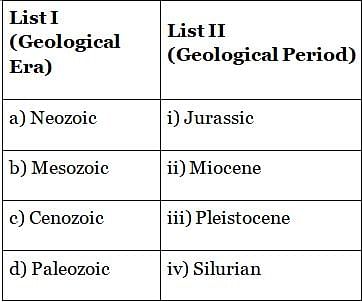KTET Paper 2: Social Science Test - 2 - KTET MCQ
30 Questions MCQ Test - KTET Paper 2: Social Science Test - 2
With reference to judiciary, identify the odd one out of the following provision:
In which part of the Hindu Temples is the image of the main deity placed?
| 1 Crore+ students have signed up on EduRev. Have you? Download the App |
Which of the following approaches has been used extensively to familiarise students with ideas in the textbook Social and Political Life published by the NCERT?
Arrange the following in ascending order starting from the earliest period
A. Swadeshi movement
B. Vernacular Press Act
C. Rowlatt Act
D. Illbert Bill
Which of the following is not included in the right to freedom of religion?
At which place in Gujarat were the teachings of Lord Mahavira and his followers presently available which were written down about 1500 years ago?
Which of the following statements are correct about the 'Indian National Movement'?
(A) The Swadeshi movement sought to oppose British rule and encourage the ideas of self-help, swadeshi enterprise, national education, and use of Indian languages.
(B) The First World War altered only the political situation in India.
(C) Indian industries expanded during the war, and Indian business groups began to demand greater opportunities for development.
The hundreds digit of a three-digit number is 7 more than the units digit. The digits of the number are reversed, and the resulting number is subtracted from the original three-digit number. The units digit of the final number so obtained is
Which of the following has the greatest affinity for haemoglobin?
Which of the following philosophical texts literally means ‘approaching and sitting near’?
If you stay in the Southern Hemisphere, which of the following will hold true about 21st June?
Consider the following statements:
1. The phenomenon of inversion is one of the causes of air pollution in Delhi.
2. The valley inversion takes place during the day with open skies.
Which of the statements given above is/are correct?
Which cognitive process is assessed in the question- What would be the time in Paris when the time in New Delhi is 12 noon?
When the subjugation of one country by another leads to political, economic, social and cultural changes, we refer to this process as:
Though India chose universal adult franchise after becoming independent, this was withheld in many other sovereign countries on the basis of certain criteria. Which of the following was not one of the criteria?
Which one of the following is not recommended by CBSE for Formative Assessment?
Which of the following is the first level of democratic government in India?
The seasonal difference in temperature is caused due to ________
The approach that is very useful in organizing the content in history is:
'Everyone has a Right to Nationality' is covered in _____ of Universal Declaration of Human Rights.
To sensitise students about the gender issues and role of socialisation in gender discrimination, schools should
Match the following List I with List II.

Choose the correct options from the following:
The flat land stretches between the Ghaggar and Teesta rivers is a part of
A teacher has presented a principle in front of students "Up to a certain level of atmosphere when altitude increases, temperature decreases". With the help of this principle, students are able to solve many temperature-related problems in different places located at different altitudes. This is an example of:
Activity-based questions make Social Science lessons
Consider the following statements and choose the correct answer from the following.
Assertion (A): The thin blanket of gases protects the earth from harmful effects.
Reason (R): Its density is maximum at the sea level and decreases upward
Which of the following types of rainfall is common along mountainous regions?


















